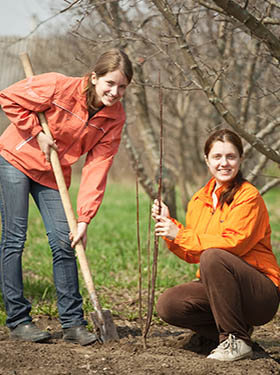OCCRL is celebrating CTE month through a four-part blog series. This is the fourth blog in the series.
As John Mellencamp famously wrote and gave voice to in the song "Small Town": “Well, I was born in a small town…and I can breathe in a small town.” This song has always resonated with me. My first residence hall at a large state university housed almost twice the population of my small town. As Career and Technical Education Month concludes, it is fitting to recognize the value of Career and Technical Education (CTE) programs to rural populations.
Research has found that vocationalism is a dominant theme in rural student college decision-making (Meece et al., 2013; Robbins, 2012). In terms of college attendance, the culture of rural areas tends to be focused on outcomes with occupational relevance to the local environment (Robbins, 2012). In the rural community context, vocational options are typically related to trade, healthcare, and service occupations (Meece et al., 2013). In addition to this vocational mindset, college aspirations can be shaped by rural families’ commitment to place and the tendency to pursue higher education within this context (Howley, 2006; Johnson Elder, & Stern, 2005). Educational aspirations and/or economic necessity more often serve as an impetus for rural youth to leave their home communities in the first place than an actual desire to leave them (Johnson et al., 2005).
Given this vocational mindset and commitment to place, CTE programs have tremendous value for rural students and communities. Despite recent federal emphasis on place as it relates to rurality, Hillman (2016) finds that geography matters when it comes to college opportunity and attainment, with “education deserts” demonstrating the stratification of opportunity for social mobility, particularly by race, income, and class. CTE programs and the institutions that support them are vital in creating opportunities for rural students and supporting rural economies. To that end, the Rural Community College Alliance provides advocacy and support for community and tribal colleges serving rural populations (Rural Community College Alliance, 2016).
A forthcoming brief on the experiences of rural Illinois community colleges participating in Pathways to Results Implementation Partnerships will further highlight the value of CTE programs in rural environments. As I reflect on my own higher education research agenda that is centered on rural student access and success, I will borrow again from Mr. Mellencamp’s song, “No, I cannot forget where it is that I come from…I cannot forget the people who love me."
References
- Hillman, N. W. (2016). Geography of college opportunity: The case of education deserts. American Educational Research Journal, 53(4), 987-1021. doi: 10.3102/0002831216653204
- Howley, C. W. (2006). Remote possibilities: Rural children’s educational aspirations. Peabody Journal of Education, 81(2), 62-80.
- Johnson, M. K., Elder, Jr., G. H., & Stern, M. (2005). Attachments to family and community and the young adult transition of rural youth. Journal of Research on Adolescence, 15(1), 99-125. doi: 10.1111/j.1532-7795.2005.00088.x
- Mellencamp, J. (1985). Small town. On Scarecrow [CD]. London, United Kingdom: Riva Records.
- Meece, J. L., Hutchins, B. C., Soo-yong, B., Farmer, T. W., Irvin, M. J., & Weiss, M. (2013). Preparing for adulthood: A recent examination of the alignment of rural youth’s future educational and vocational aspirations. Journal of Educational and Developmental Psychology, 3(2), 175-192. doi 10.5539/jedp.v3n2p175
- Robbins, B. M. (2012). “People like us don’t go there”: Local culture and college aspirations in rural Nebraska. Yale Journal of Sociology, 9, 98-129.
- Rural Community College Alliance. (2016). “Opening doors they alone open” [Website].
